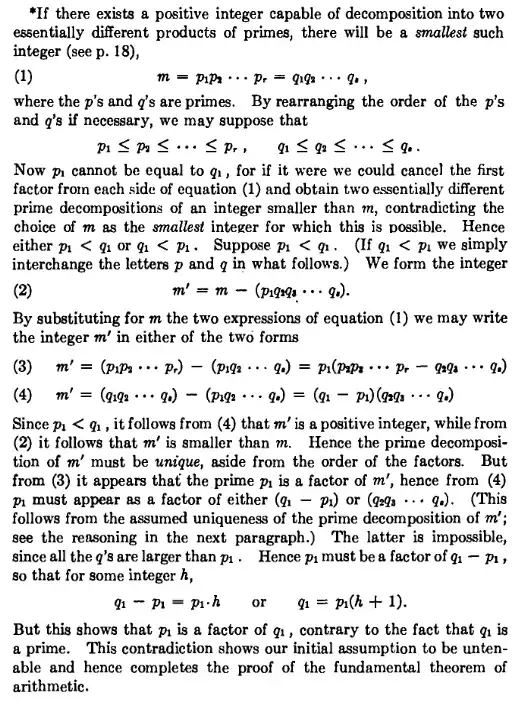It appears that the troublesome aspect of the proof is the negative contradictory form of induction that is employed, i.e. the contrapositive of complete induction (Fermat's infinite descent). This is easily eliminated by rewriting the proof to use complete induction, as is done below.
Suppose as inductive hypothesis that the prime factorization of every natural $< m\,$ is unique up to order. We prove that the same holds true for $\,m.\,$ Consider any two prime factorizations of $\,m$
$$\tag{1} m\, =\, p_1 p_2\cdots p_r =\, q_1 q_2\cdots q_s$$
where the $p$'s and $q$'s are primes. By reordering if need be, we may assume that
$$ p_1 \le p_2 \le \cdots \le p_r,\quad q_1 \le q_2 \le \cdots \le q_s$$
We prove $\,\color{#0a0}{p_1 = \ q_1}.\,$ We may assume $\,p_1 \le q_1$ (else change notation: swap $p$ and $q).\,$
Let $$\tag{2} m' = m - p_1 q_2 q_3\cdots q_s$$
By substituting for $\,m\,$ its two factorizations in equation $(1)$ we obtain
$$\begin{eqnarray}
\tag{3} m' &=\,& p_1 p_2\cdots p_r -\, p_1 q_2\cdots q_s &=\,& p_1 (p_2\cdots p_r -\, q_2 q_3 \cdots q_s) \\
\tag{4} m' &=\,& q_1 q_2\cdots q_s -\, p_1 q_2\cdots q_s &=\,& (q_1-p_1)(q_2 q_3\cdots q_s) \end{eqnarray}$$
Suppose $\,\color{#c00}{p_1 \ne q_1}\,$ Then $\,p_1 < q_1\,$ so it follows by $(4)$ that $\,m'>0$, while $\,m'<m\,$ by $(2).\,$
So, by induction, the prime factorization of $\,m'\,$ is unique, up to order.
From $(3)$ it follows that $\,p_1\,$ is a factor of $\, m'.\,$ Thus, by uniqueness,
$\,p_1\,$ must also appear as a factor in $(4)$, i.e. as a factor of either $\,q_1 - p_1$ or $\,q_2\cdots q_s.\,$ The latter is impossible,
since all the $\,q_i\,$ are primes larger than $\,p_1.\,$ Hence $\,p_1\,$ is a factor of $\,q_1 - p_1,\,$
i.e. there is an integer $\,k\,$ such that $\, q_1 - p_1 = k p_1,\,$ so $\,q_1 = (k\!+\!1) p_1.\,$ Thus $\,p_1\,$ is a factor of $\,q_1,\: $ contra prime $\:q_1 > p_1.\, $ This contradiction proves that our assumption $\,\color{#c00}{p_1\ne q_1}\,$ is false, so $\,\color{#0a0}{p_1 = q_1}\,$ as claimed.
Cancelling $\,\color{#0a0}{p_1\! = q_1}\,$ from both sides of equation $(1)$ and applying the inductive hypothesis,
we infer that the smaller number $\, m/p_1 = p_2\cdots p_r =\, q_2\cdots q_s\,$ has unique factorization,
so $\, r = s\,$ and $\, p_2\! = q_2,\ p_3\! = q_3,\ldots, p_s\! = q_s.\,$ Hence the factorizations
in $(1)$ are the same up to order. $ $ QED
